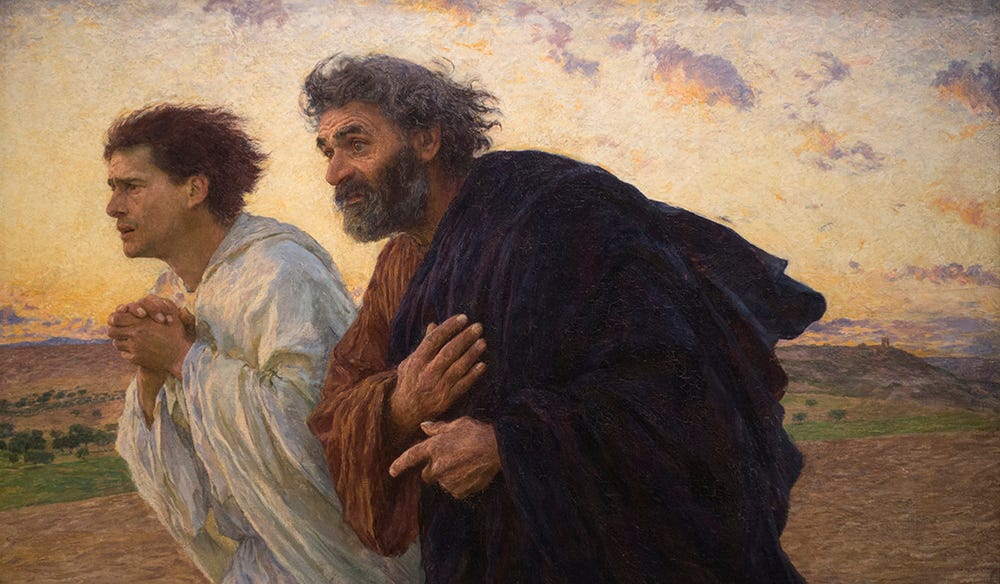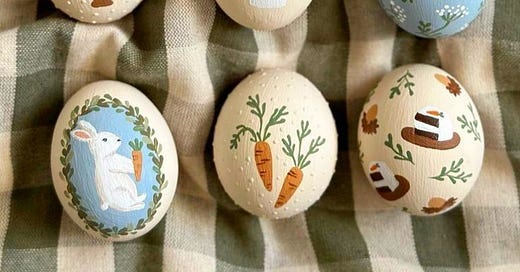In your kindness stop and say a prayer for the soul of Pope Francis today. Eternal rest grant unto him, O Lord, and let perpetual light shine upon him.
Hallelujah, he is risen!
It is such good news. And who among us couldn’t use some of that?
I’m tempted to say, who among us couldn’t use some of that in times like these, but I resist the urge. We like to say “in times like these” as if the world is not one long narrative of this group conquering that one; of this group oppressing that one; of this group treating that one like dogs. Since the time of Jesus and long before, times like these have meant strife and grief.
Every single morning one of my children asks to snuggle up to me and wants me to read her poems. She always smiles at me as if the joy I’m bringing her is beyond words. I hold her close, as if I could meld the two of us together: these are the moments that recharge me like a battery. That smile is meaningful, because our lives are not untouched by sorrow. That’s life. Whose is? Thank God (literally) that those of us who are carrying these sorrows know that that’s not the end of the story. Those of us who are walking through the world with heavy burdens know that those burdens are not wasted.
Of all of the shitty theological takes I’ve borne witness to—and oh, my friends, that’s a long list—my least favorite is when people attempt to proclaim that Jesus’ resurrection was, like, in our hearts! His words live on, so he lives on! He as alive because he’d made such an impression on the apostles!
…no.
Jesus literally rose from the dead. He actually got up outta that grave.
You don’t need my meaningless permission to seek and hold that truth tightly today but I’m giving it to you anyway. Death has been conquered.
What if you lived like it was true, just for today?
Just for an hour? Just for ten minutes? No, I’m serious: give it ten minutes of sitting there, inhaling and exhaling like a weirdo. Jesus died for me. Jesus rose from the dead. Jesus died for me. Jesus rose from the dead.
I’m talking to my doubters, my cynics, my wrestlers. Those of us who respond to people’s Holy Land pilgrimages with “okay, but was that REALLY where Jesus was born? How do we, like, KNOW that?” I’m talking to those of us who hear a Christian leader say something and start poking holes in their arguments in our heads before they’ve finished the sentence. The “yeah, but-”ers, the “okay, but what about-”ers. The ones who were not “a pleasure to have in class”. The enneagram 4s and 8s. The bet hedgers1.
You don’t have to do that. At least, not today. Tomorrow, you can go back to being Thomas if you want, asking to put your fingers in the hole of Jesus’ side, but today, be Mary Magdalene, who saw him and exclaimed I have seen the Lord. You can loosen your grip, just to see how it feels. You can stop feeling the need to measure and analyze every single thing, and accept the imperfectness around you as the gifts God’s given you. You can take baby steps towards a radical faith—towards serving and praying and stretching your heart. Or you can just jump off that wild, unruly cliff of belief and hold out your hands, ready to be caught.
How would your life look different? Who would or wouldn’t be in it? What would your mornings look like? What about your bank account? What about your job? What would shift, morph, or change if you let your self believe Jesus? If you asked him for the grace to do so? If you even had the courage to take that question to prayer today?
We can get so caught up in the minutia. It can feel impossibly important. What about this teaching? What about that problematic priest? What about the church’s response to XYZ? Are we doing enough? Are we saying enough? Are we saying things right? Are we voting correctly? Are we listening to the right people? Are we going to the right protests, and posting the right quotes, and teaching our kids the right things?
But what if it’s true? And what if those questions are missing the point?
Saint John the Evangelist2 is one of my saints of the year in 2025. I just love that guy—his youth and his spirit; the way he wanted everyone to know that JESUS REALLY, REALLY LOVED HIM, OKAY?! I empathize with that so much. I guess I feel a connection to a young writer who was out there trying to save the world, scribbling things down.

John wrote in his Gospel that Jesus said: “These things have I spoken unto you, that my joy may be in you, and that your joy may be made full.” I think we get so used to hearing these statements that they start to lose their radical nature, or at least they do for me. But then I stop and think about how absolutely freaking wild this faith of ours is. Jesus came so that we could have joy, in the midst of all of the things the world would throw at us.
So to the person who emailed me the other day how I could possibly find peace and rest in times like these, or the dear friend who knows the depth of some of my suffering and took me by the shoulders asking me, dead serious, how the hell I was making it through: this is how.
I am attempting every single day to live as if the Gospel were true: that you don’t need to fit in any kind of box to be beloved by Christ, that the lowly would be lifted up while the mighty are casted down, and that death no longer stings. Some days I am really, really bad at it. Some days I google things like “historical evidence of the apostles”. Some days I ask God angry questions, like why and for how long and what the hell are you doing up there. Some days I can’t even talk to God, so I talk to Mary Magdalene instead. But the Good News of our faith is not that we would suddenly become perfect. It’s that in our imperfections, we have been saved from what we deserve and brought towards what we’ve been given. We all have the potential to be saints, if we accept the grace the Lord is willing to give us.
This is not spiritual bypassing; this is not closing my eyes. This is keeping them wide open.
As Pope Francis said in his last public homily—just yesterday, on Easter—“we must take action, set out to look for [Jesus]: look for him in life, look for him in the faces of our brothers and sisters, look for him in everyday business, look for him everywhere except in the tomb.”
I am so glad Jesus loves us. And I tried to think of an artsier way to say that, something much more Substack-shareable. Something deeper or more profound. But I can’t come up with anything, or at least anything that feels more pure. I just am—I am so, so glad Jesus loves us.
Happy Easter, friend! I am so glad you’re here. Peace be with you.
On My Nightstand
Story of a Soul by St. Therese of Lisieux: I have read this book about five times, and every time, I’m struck by something new. I’m currently working on a project that involves research about the Martin family, and I was so happy to dive back in and spend time with Therese. If you’ve never read her memoir, I can’t recommend it enough (and if you have tried it and thought she seemed like a whiny brat, try again! I very much felt that way the first time I read it! I’m a firm believer that books meet us when they’re meant to!)
Policing AI Doesn’t Work: I wanted to stand up and cheer when I read this piece by
, who I’ve followed for ages. I don’t homeschool, but I like to incorporate lots of homeschool practices in our room, and I have some unorthodox views on education. I don’t like AI either but the conversation around it has felt like it’s missing something fundamental—and I think Julie nails it, here.The Incident in Gabby Petito’s Documentary That Most Shocked Me: Have you watched the Netflix doc on Gabby Petito, the #camperlife influencer who was murdered by her partner? I was so struck by how terrible law enforcement handled an initial 911 incident, and this writer agreed. “These are big red flags for any woman who has experienced abuse and understands those dynamics: immediately taking full responsibility for everything, admitting to a struggle with a mental illness, believing that a bad mood is justification for a boyfriend’s or husband’s cruel behavior. I waited for the officer to pick up on any of that…but he appeared oblivious.”
In case you missed these Letters:
This newsletter isn’t free to make.
…but it was free for you to read. If you’ve made it this far, I know you’re trying to cultivate a feminist faith. Our full subscribers keep our lights on—I literally could not write these letters without them. If you’ve gotten something out of my work, I would so appreciate a prayerful consideration to upgrade. Full subscribers snag access to our archives, our Advent podcasts, our upcoming summer read-along, and more. Thank you so much.
I am a professional writer but I need to let you know that this said “hedge betters” for the first few drafts and I kept reading it aloud, knowing it didn’t sound right. You don’t bet your hedges, you hedge your bets. 😂
For the curious, this year I’m especially praying with St. John, St. Mary Magdalene, and St. Bernadette.











I recently heard something that felt like new information to me, "Ask better questions." Whatever question you ask, they said, that's what you'll spend your time thinking about. So choose to ask about things that will help you grow. I don't think that advice was saying to ignore the hard stuff. I think that advice was saying, check your attitude. I think this post does that super well. And I think this is a good question.
"Or you can just jump off that wild, unruly cliff of belief and hold out your hands, ready to be caught." I love the freedom that this image/feeling invokes in me!